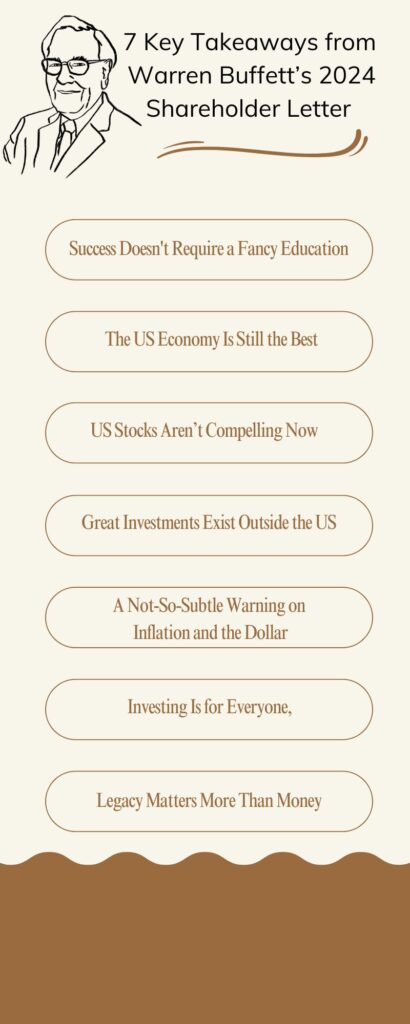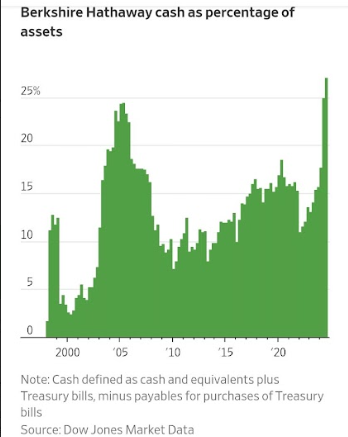
Warren Buffett’s annual letters aren’t just updates for Berkshire Hathaway shareholders—they’re masterclasses in investing, business, and life itself. This year’s letter was shorter than usual but still packed with wisdom. Buffett, now 94, reflected on his investment perspective, the economy, and the future of Berkshire. He reaffirmed his core beliefs, hinted at concerns about inflation, and shared insights that reinforce timeless investment principles.

The First Letter Without Charlie Munger
This letter is the first in half a century in which Buffett reflects on his doings without the input of longtime partner and right-hand man, Charlie Munger, who passed away in late 2023. Munger’s sharp wit, profound wisdom, and ability to challenge Buffett’s thinking were invaluable to Berkshire Hathaway. His absence was felt—not just in the letter’s content but in its tone. While still insightful, it lacked some energy and punch that Munger often infused into their discussions. Even so, the letter remains essential reading from the world’s most respected and famous investor.
Here are the key takeaways from the 2024 letter, released in late February 2025.
Success Doesn’t Require a Fancy Education
Buffett has never cared where a CEO went to school. One of the best managers he ever worked with, Ben Rosner, “never went past 6th grade.” That speaks volumes. While education is valuable, financial and business acumen come from real-world experience, not diplomas. This challenges the notion that expensive degrees are necessary for success—especially in an era where the ROI of traditional education is more questionable than ever.
The US Economy Is Still the Best Game in Town—But Not Perfect
Buffett remains a firm believer in the power of capitalism and the American economy. “It has its faults and abuses, in certain respects more egregious now than ever, but it also can work wonders unmatched by other economic systems.” The US stock market has created immense wealth for disciplined investors, and despite its flaws, capitalism remains the most effective engine for prosperity. But Buffett isn’t blindly optimistic—he acknowledges that economic imbalances and abuses exist, perhaps more than ever.
The Price of US Stocks Is Too High Right Now
Buffett is a disciplined value investor, and this year, he made it clear: he’s struggling to find value in today’s US stock market. In his words, “Nothing looks compelling.” Instead of deploying more capital, Berkshire’s cash holdings have hit an all-time high—over $334 billion by the end of 2024. This chart from the Wall Street Journal depicting the percentage of assets Berkshire Hathaway holds in cash speaks volumes.

When even Buffett, a long-term optimist on American business, hesitates to buy, it reinforces my concerns about excessive risk-taking in today’s tech-driven markets. While the S&P 500 remains a solid long-term investment, it’s crucial to remember that it can fall drastically occasionally, especially from such lofty heights.
Great Investments Exist Outside the US
While Buffett is the ultimate champion of American business, his most admired investments today are five Japanese conglomerates in which Berkshire holds significant stakes. He notes that “They very successfully operate in a manner somewhat similar to Berkshire itself.” Their stock prices remain far cheaper than equivalent American companies, and their executives don’t demand sky-high compensation. The takeaway? Good value isn’t exclusive to the US, and international diversification is worth considering.
A Not-So-Subtle Warning on Inflation and the Dollar
Buffett has always been alert to inflation risk, and views US business investments as a good place to outpace the relentless erosion of purchasing power. This year, he makes an unusually pointed comment about these concerns: “Uncle Sam, never forget that we need you to maintain a stable currency.” Translation? He’s concerned about Washington’s reckless fiscal policies and the long-term value of the US dollar. With bipartisan disregard for responsible spending, investors should always remain alert to inflation risks. Buffett has long favored businesses with strong moats and pricing power, something to remember when building an endurant portfolio.
Investing Is for Everyone, Not Just the Elite
Buffett’s letter reinforces a key truth: American businesses have been the most significant wealth creators in history, and anyone can participate through stock market investing. You don’t need to be a Wall Street insider or a business genius—just disciplined, patient, and willing to let compounding work its magic. This aligns with my long-standing view that people should focus on simple, long-term investing via growth index funds rather than chasing get-rich-quick schemes or relying on traditional college education to guarantee financial success.
Legacy Matters More Than Money
Buffett, ever self-aware, acknowledges the reality of aging. He humorously shares that he now enjoys discussing “the joys of old age and the exciting topic of walking canes” with his 91-year-old sister. But beneath the humor is a humbling truth: No matter how much wealth one accumulates, we all leave this world as empty-handed as we arrived. What matters is the impact we make and the legacy we leave.
One of the Best Business & Investing Textbooks You Can Read
I’ve valued Buffett’s shareholder letters so highly that I’ve read every single one—some of them multiple times. If you want a very readable textbook on business, investing, accounting, and countless other critical financial topics, I strongly recommend getting Berkshire Hathaway Letters to Shareholders (a collection of his letters).
Or, if you prefer, you can download them for free, though one at a time, from the Berkshire Hathaway sparse website (click here).
Want to dig deeper?
Try these related articles
Buffett’s the Best—and Why That Matters
5 Fantastic Money Books Worth Your Time
Investment Risk Versus Reward: Navigating the Complex Relationship